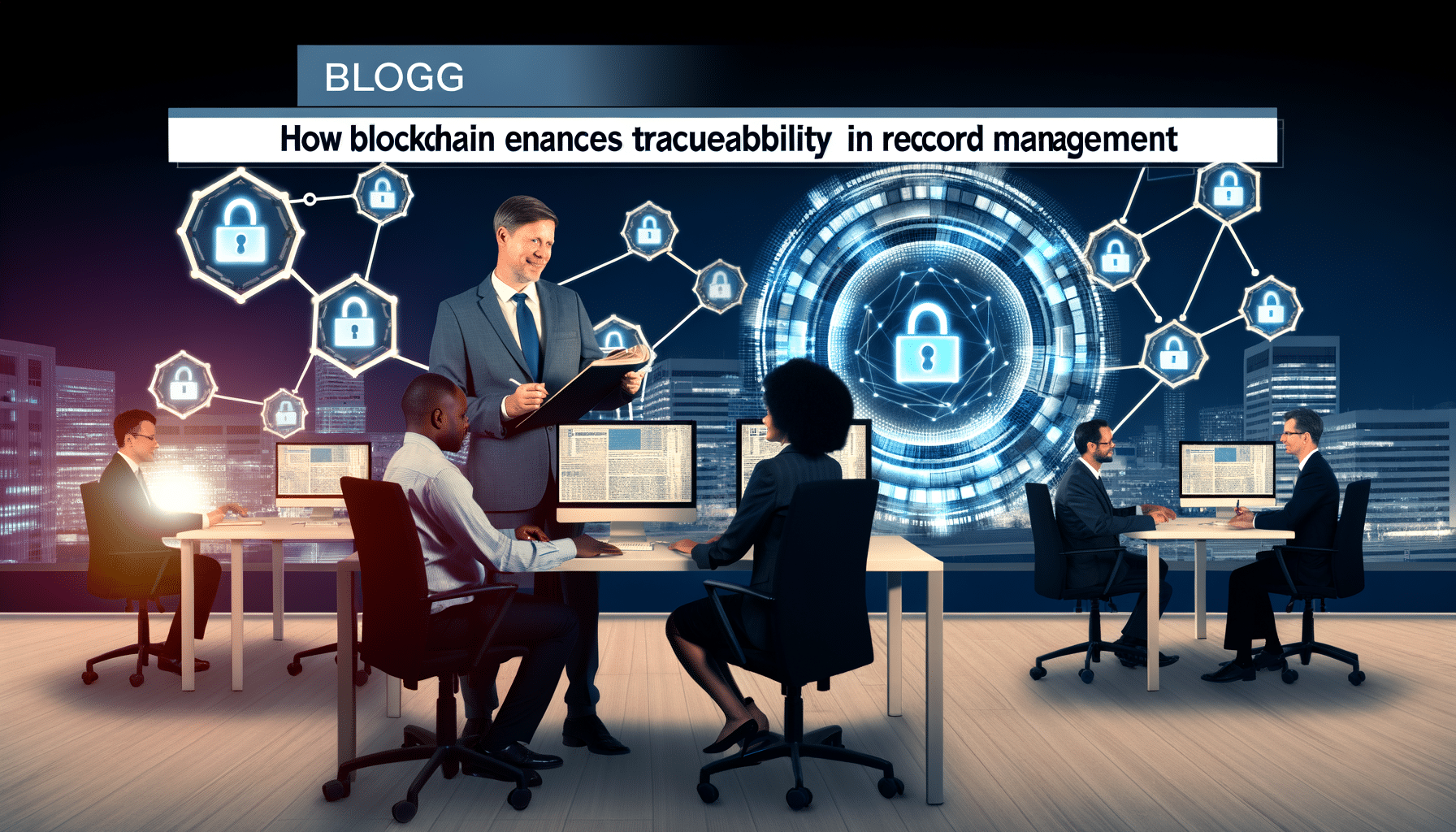- Advanced
- January 7, 2023
How Blockchain Enhances Traceability in Record Management

In today’s fast-paced digital world, the integrity and traceability of records are more crucial than ever. As someone deeply involved in transforming how organizations handle their records, I’ve seen firsthand how incorporating blockchain technology can enhance these two essential attributes. Businesses in industry sectors like legal, finance, and compliance, where record accuracy and accountability are paramount, stand to benefit immensely from this innovation.
Understanding the Traceability Challenge in Record Management
For those tasked with managing records, inconsistencies, discrepancies, or even breaches can result in severe consequences, from damaged reputations to financial penalties. Traceability in record management is not just about recording what has happened but ensuring that every action taken on a record is auditable and tamper-proof. This level of transparency is where traditional methods fall short, and where blockchain shines as a revolutionary technology.
What Blockchain Brings to the Table
Blockchain technology might be best known for its role in cryptocurrencies, but its potential extends far beyond to several other fields, including record management. Here’s how:
- Decentralized Ledger: Blockchain operates on a decentralized ledger that records every transaction across a network of computers. This distribution makes it almost impossible for any single user to alter records, safeguarding against tampering and ensuring the authenticity of the data.
- Immutable Records: Once a record is placed on the blockchain, it cannot be modified. This immutability is a cornerstone feature that guarantees the data’s integrity, rendering records tamper-proof and vastly improving accountability.
- Traceability: Each block in the chain is linked to the block before it and contains a timestamp and transaction data. In this way, blockchain creates an traceable chain of records that can be easily audited, providing a clear and transparent history of the documentation process.
Practical Applications of Blockchain in Record Management
At RecordsKeeper.AI, we’ve integrated blockchain to overcome challenges organizations face with traditional record management systems. Let me walk you through some innovative applications and benefits:
Ensuring Data Integrity
Traditional databases are susceptible to mistakes and fraud, deliberately or otherwise. Blockchain resolves this vulnerability by creating a secured environment where every record is uniquely encrypted. This guarantees that each data point remains unaltered post-validation, preserving its original state for future reference.
Secure Data Rooms
Sharing sensitive data frequently involves risks associated with unauthorized access. However, blockchain ensures controlled access by producing a transparent log of who accessed what, and when, through secure data rooms. The result? Empowering businesses with precise control over their information while preserving confidentiality.
Compliance Management
Many sectors are required to comply with stringent regulations, such as GDPR, HIPAA, or SOX. Blockchain helps automate compliance workflows by maintaining immutable logs and providing an audit trail, simplifying adherence to these regulations without the need for complex, manual verification processes.
Strategizing Record Retention Policies
With blockchain’s automated features, companies can enforce record retention policies without concern over manipulation. Blockchain automates data retention and deletion processes, ensuring compliance with both industry regulations and organizational standards consistently.
The Future of Blockchain in Record Management
The alliance between blockchain technology and record management promises a future where traceability and accountability are not just ensured but greatly enhanced. As organizations journey into the future, marrying these technologies creates a strategic advantage, unlocking unparalleled efficiency and security.
As one pioneering RecordsKeeper.AI, it is my vision for businesses, governments, and individuals to harness the transformative power of emerging technologies like blockchain to redefine record management—from a burdensome chore to an adoptive strategy aligned with rigorous integrity and transparency standards.
Join me on this journey of technological transformation and discover how RecordsKeeper.AI is spearheading trust and innovation in record management systems. To keep up with more insights and breakthroughs in tech innovation, follow our updates and embark on your digital transformation with us.
Toshendra Sharma is the visionary founder and CEO of RecordsKeeper.AI, spearheading the fusion of AI and blockchain to redefine enterprise record management. With a groundbreaking approach to solving complex business challenges, Toshendra combines deep expertise in blockchain and artificial intelligence with an acute understanding of enterprise compliance and security needs.
Related Posts

Real-Time Record Synchronization in Blockchain Networks
Learn how blockchain ensures real-time synchronization of records across networks.
- March 18, 2023

Zero-Knowledge Proofs in Blockchain for Confidential Record Management
Understand how zero-knowledge proofs protect sensitive records in blockchain systems.
- February 23, 2023
Archives
- December 2024
- November 2024
- October 2024
- September 2024
- August 2024
- July 2024
- June 2024
- May 2024
- April 2024
- March 2024
- February 2024
- January 2024
- December 2023
- November 2023
- October 2023
- September 2023
- August 2023
- July 2023
- June 2023
- May 2023
- April 2023
- March 2023
- February 2023
- January 2023
- December 2022
- November 2022
- October 2022
- September 2022
- March 2019
Want to get more content like this?
Signup to directly get this type of content to your inbox!!
Latest Post
Organizing External Auditor Access
- December 22, 2024
Document Control in Manufacturing Plants
- December 21, 2024
Handling Rush Financial Report Requests
- December 20, 2024
Managing Record Access After Staff Changes
- December 19, 2024





